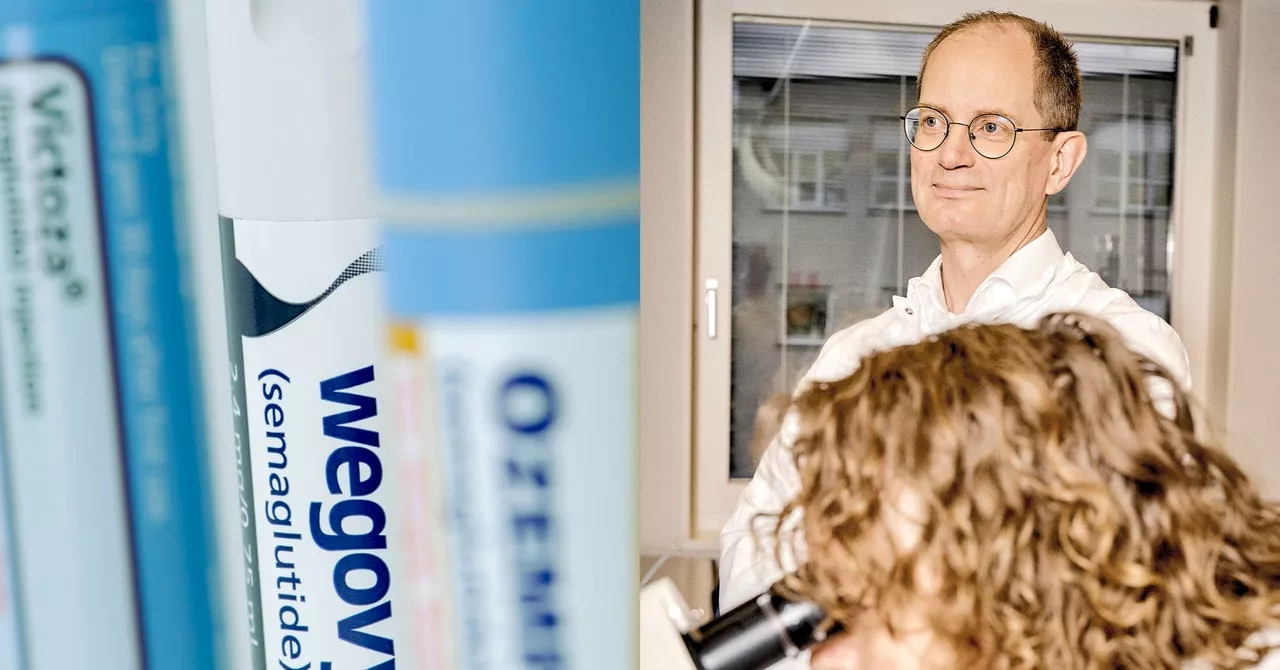This article explores the story of Novo Nordisk, a pharmaceutical company that rose to prominence by producing insulin and is now a global leader in weight-loss drugs. The article focuses on the ethical challenges the company faces as it navigates the booming semaglutide market, which threatens to overshadow its legacy of saving lives through insulin.
This was 1942. The Nazis occupied Denmark and eugenics was their first medical principle. Trauma like Erik’s fall, some suggested, activated diabetes, and the bloodline of the diabetic was poisoned. Three short weeks of neglect, the doctor promised Hageman’s parents, and their little son would perish of ketoacidosis or starvation. “The best you can do is do nothing,” the doctor said.
Still, Hageman’s parents felt—and this was rebellious, given the master-race ideology that crackled through the Nazi Weltanschauung—that their boy deserved to live. When Hageman’s father, a custodian at a sports college, told his coworkers his son had diabetes, one of them knew a guy. Hans Christian Hagedorn, short-tempered physician. Wild tufts of hair. At Nordisk Insulinlaboratorium just outside of Copenhagen, he was refining insulin from the pancreases of cows and pigs to make it work better for humans. During a long period under Hagedorn’s care, Erik Hageman started to get twice-daily injections of a fine precipitate of protamine insulin, a breakthrough formulation that prolonged insulin’s effects in the body. Neutral Protamine Hagedorn is still on the World Health Organization’s list of essential medicines. By the time he was 5, Hageman was injecting himself with a wide-gauge needle as broad as—he pantomimed to me, in a kind of diabetic fish story—a tree trunk. At 85, Erik Hageman is a dapper grandfather of surpassing warmth, compact like a tap dancer. He’s one of the longest-living diabetics in Denmark. We spent an afternoon together in a modernist mansion in Copenhagen called Domus Hagedorn, which is owned by Novo Nordisk, the Danish firm that grew from Hagedorn’s lab. “Hagedorn was rather crazy,” Hageman told me. But without the doctor’s care, he explained, “I’d be blind and I’d have to cut off my legs and have kidney failure.” The now-global company makes half the insulin in the world. Yet today it’s rich and famous for producing Ozempic, the megahit semaglutide drug. Just before visiting Erik Hageman, I met Lars Fruergaard Jørgensen, who has presided over the company’s epochal metamorphosis, at the company’s headquarters in Bagsværd, a suburb of Copenhagen. The building’s design, with its giant helix-like indoor spiral staircase, is inspired by insulin—the molecule, the miracle. In a conference room flooded with light, Jørgensen spoke fondly of Hageman, the company’s poster child. Novo’s executives had clearly presented Hageman to convince me that the company’s greatest achievement is not its stratospheric valuation but its century-long record of saving lives with insulin. But at Novo these days, semaglutide blocks out the sun. Ozempic was the world’s second-highest-selling drug in 2024. It works extremely well for type 2 diabetes, a non-autoimmune disorder in which the body makes poor use of insulin. And one effect of semaglutide, as we all know now, has been the box-office draw from day one: appetite suppression. The drugs that contain it—especially Ozempic and its more powerful sister Wegovy—have transformed Novo into a global slimming juggernaut. In 2023, the company surpassed Parisian luxury brand LVMH to become the richest company in all of Europe, hitting the ludicrously high market cap of $424 billion. In 2024, Novo took a punch in the face, but it ended the year still richer by market cap than Bank of America, Coca-Cola, and Toyota. Beyond the dazzling before-and-afters, though, Jørgensen is looking at a tricky future, parts of which, he told me, “scare the hell” out of him. Though Novo has as its controlling shareholder the largest altruistic foundation in the world, it has to act coldly and tactically, like an oil or defense company. The demanding semaglutide business has become a mean ouroboros: the insatiable market, exorbitant manufacturing costs, competition from Eli Lilly, pricing pressure from governments, and the private-insurance dystopia in the US—by far Novo’s biggest market, where some 15 million people now take semaglutide. At the same time is the moral crux. Semaglutide alone almost never works for the 8.4 million type 1 diabetics around the world. What keeps Jørgensen up at night is his fear that, the way drug manufacturing and American health care companies and global markets work, his company might not be able to do right by its original patients. These are the non-Hollywood patients—the ones who, like Eric Hageman, can’t live without insulin. GLP-1 can be seen as a tranquilizer for the flesh, a soother of deep and primitive longings. GLP-1 says to the body: peace. Food is available. But GLP-1 in its natural form only murmurs these soothing blandishments for a minute or two. It affords the hungry soul a glimpse of OK-ness, but a fleeting one. The challenge for Knudsen was to build a dupe of GLP-1 that would persist, a GLP-1 that would let a patient feel blood-sugar equanimity longer. Knudsen pulled this off by snapping a fatty acid onto a precise spot on a chain of amino acid
Health NOVO NORDISK SEMAGLUTIDE OZEMPIC INSULIN TYPE 1 DIABETES ETHICS PHARMACEUTICAL INDUSTRY WEIGHT LOSS
United States Latest News, United States Headlines
Similar News:You can also read news stories similar to this one that we have collected from other news sources.
 Israel Faces Moral Dilemma in Hostage Deal with HamasIsrael has reached a ceasefire with Hamas after a brutal war, but the agreement requires the release of hundreds of terrorists in exchange for hostages. This decision presents Israel with a complex moral and strategic dilemma as the nation grapples with the potential for future attacks and the impact on national morale.
Israel Faces Moral Dilemma in Hostage Deal with HamasIsrael has reached a ceasefire with Hamas after a brutal war, but the agreement requires the release of hundreds of terrorists in exchange for hostages. This decision presents Israel with a complex moral and strategic dilemma as the nation grapples with the potential for future attacks and the impact on national morale.
Read more »
 The Moral Dilemma of Internment: Lessons from WWII Japanese American Internment LawyersThis article explores the ethical challenges faced by lawyers working for the War Relocation Authority (WRA) during the Japanese American internment during World War II. It examines their diverse responses, ranging from principled resignations to strategic accommodations, highlighting the complexities of navigating a system rooted in injustice.
The Moral Dilemma of Internment: Lessons from WWII Japanese American Internment LawyersThis article explores the ethical challenges faced by lawyers working for the War Relocation Authority (WRA) during the Japanese American internment during World War II. It examines their diverse responses, ranging from principled resignations to strategic accommodations, highlighting the complexities of navigating a system rooted in injustice.
Read more »
 A Moral Dilemma: Balancing Family Obligations and Financial SecurityA man struggles with the decision of whether to use a windfall inheritance to save his brother's life, knowing it could jeopardize his children's future financial security.
A Moral Dilemma: Balancing Family Obligations and Financial SecurityA man struggles with the decision of whether to use a windfall inheritance to save his brother's life, knowing it could jeopardize his children's future financial security.
Read more »
 'Weight loss is misunderstood': New health and weight loss shake taking Utah by stormJoel Bikman and his scientist brother, the co-founders of an innovative new health and weight loss company, are using the latest science to help set the record straight to help people get much healthier.
'Weight loss is misunderstood': New health and weight loss shake taking Utah by stormJoel Bikman and his scientist brother, the co-founders of an innovative new health and weight loss company, are using the latest science to help set the record straight to help people get much healthier.
Read more »
 6 Best Weight Loss Treatments: Ranking Top Weight Loss Solutions of 2025Affiliate. Explore the top six weight loss brands currently on the market in 2025.
6 Best Weight Loss Treatments: Ranking Top Weight Loss Solutions of 2025Affiliate. Explore the top six weight loss brands currently on the market in 2025.
Read more »
 Is Weight Cycling Bad for You?This article explores the implications of weight cycling, where individuals lose and regain weight, on long-term health. It examines the biological mechanisms behind weight regain, the perceived risks associated with yo-yo dieting, and the latest research findings on the health impacts of weight cycling.
Is Weight Cycling Bad for You?This article explores the implications of weight cycling, where individuals lose and regain weight, on long-term health. It examines the biological mechanisms behind weight regain, the perceived risks associated with yo-yo dieting, and the latest research findings on the health impacts of weight cycling.
Read more »
